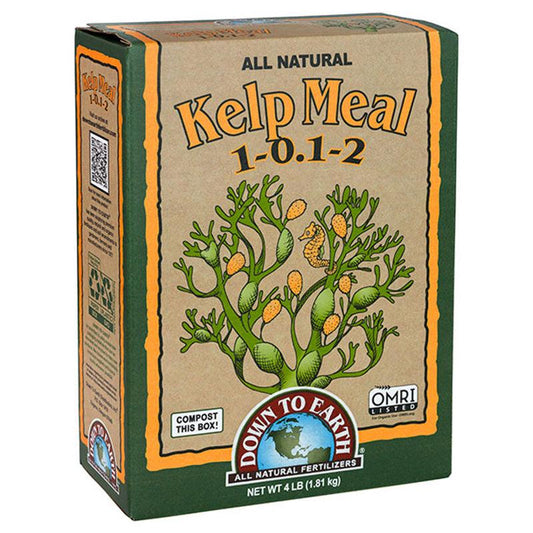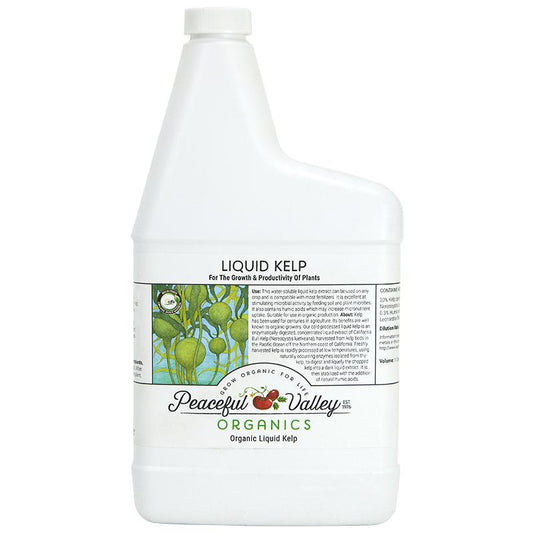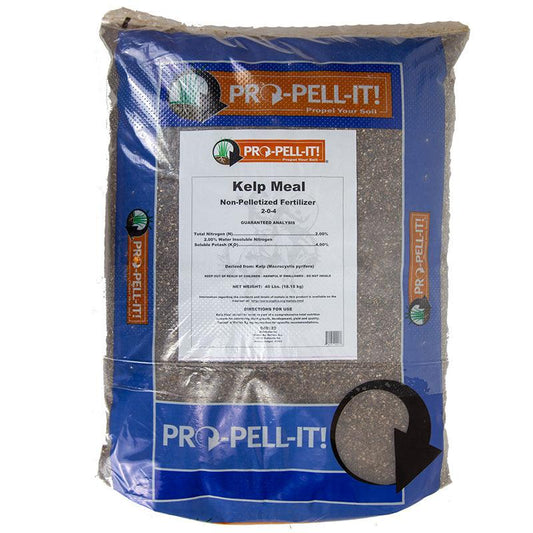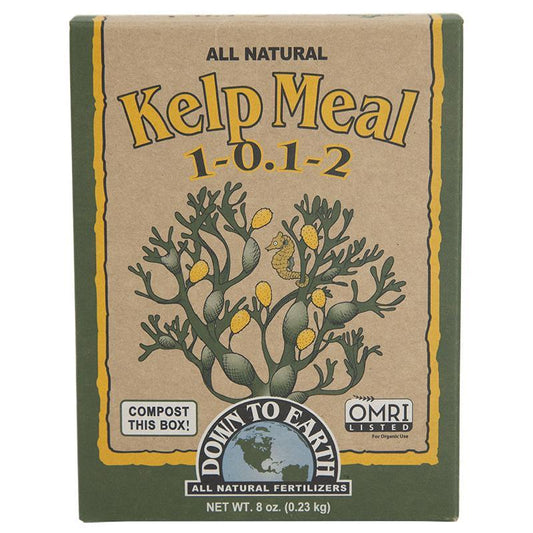Collection: Add Kelp for Trace Minerals and More!
Liquid kelp fertilizer, derived from ascophyllum nodosum, harnesses the rich nutrients of the ocean to provide plants with a natural and effective source of trace minerals, potassium, and other essential elements. Available in both liquid and kelp meal form, these fertilizers enrich your soil by adding valuable trace minerals and potassium. Liquid kelp fertilizer acts as an excellent plant food, promoting robust root and plant growth, ultimately improving overall plant health. Liquid kelp for plants can be easily applied using a spray bottle or mixed into the soil for sustained benefits. Eco-friendly and sustainable, liquid kelp fertilizers are an ideal solution to enhance soil quality and boost your harvest. In this guide, we’ll explore the characteristics, benefits, and practical applications of liquid kelp fertilizer, highlighting why it's a valuable addition to any gardener’s toolkit.
Understanding Kelp Fertilizers:
-
Source of Nutrients: Kelp seaweed, the primary ingredient in kelp fertilizers, is derived from the vast and renewable resource of the ocean. This natural and sustainable source provides a treasure trove of essential nutrients for plant health and vitality.
-
Trace Minerals: Kelp fertilizers are prized for enriching the soil with an array of trace minerals. These minerals, including but not limited to iron, manganese, zinc, and copper, play a pivotal role in supporting plant growth, photosynthesis, and overall nutrient uptake.
-
Potassium Enrichment: Alongside trace minerals, kelp fertilizers are rich in potassium, a vital nutrient that enhances plant vigor, root development, and stress tolerance. Potassium helps plants resist diseases, withstand adverse weather conditions, and produce high-quality fruits and vegetables.
-
Versatile Forms: Kelp fertilizers are available in various forms to suit different gardening preferences. Liquid kelp can be mixed with fish fertilizers and applied as a foliar spray, benefiting both new seedlings and established plants. Kelp meal, on the other hand, can be applied directly to the soil or incorporated into potting mixes.
Practical Uses of Kelp Fertilizers:
-
Soil Enrichment: Incorporating kelp meal into the soil enriches it with essential nutrients, enhances soil structure, and promotes microbial activity. This leads to improved soil fertility, nutrient retention, and water-holding capacity.
-
Foliar Application: When mixed with fish emulsion or other organic fertilizers, liquid kelp can be applied as a foliar spray. This method provides plants with a direct and rapid nutrient boost, stimulating healthy foliage growth and enhancing nutrient absorption.
-
Boosting Root Development: Kelp fertilizers are particularly beneficial for root growth. The abundance of trace minerals and growth-promoting hormones in kelp encourages robust root systems, allowing plants to access water and nutrients more efficiently.
-
Enhanced Flowering and Fruit Production: Regular use of kelp fertilizers has been associated with increased flowering and fruiting in many plants. The potassium content in kelp supports the development of blooms and fruits, resulting in a more productive garden.
Benefits of Kelp Fertilizers:
-
Sustainable Sourcing: Kelp seaweed is a renewable resource harvested from the ocean, making it an environmentally friendly choice for gardeners who prioritize sustainability.
-
Improved Soil Health: Adding kelp fertilizers enhances soil quality by increasing its nutrient content, fostering beneficial microbial activity, and improving overall soil structure.
-
Enhanced Plant Resilience: The potassium and trace minerals in kelp help plants withstand stressors such as drought, pests, and diseases, contributing to healthier and more robust growth.
-
Bountiful Harvests: Kelp fertilizers promote vigorous plant growth, leading to increased yields of fruits, vegetables, and ornamental blooms.
-
Eco-Friendly Gardening: By choosing kelp fertilizers, gardeners support environmentally responsible gardening practices that benefit both plants and the planet.
In conclusion, kelp fertilizers offer gardeners a natural and sustainable means of nourishing their plants with essential trace minerals, potassium, and other nutrients sourced from the ocean. Whether applied to the soil or used as a foliar spray, these fertilizers improve soil health, enhance plant vigor, and increase harvests. By incorporating kelp fertilizers into their gardening routine, enthusiasts can embrace eco-friendly practices and cultivate thriving gardens that reflect the power of the ocean's bounty.
See our recent informational guide on using kelp meal to fertilizer your garden.











